In Through The Back Door
The nobility of the restaurant trade.
By John T. Edge
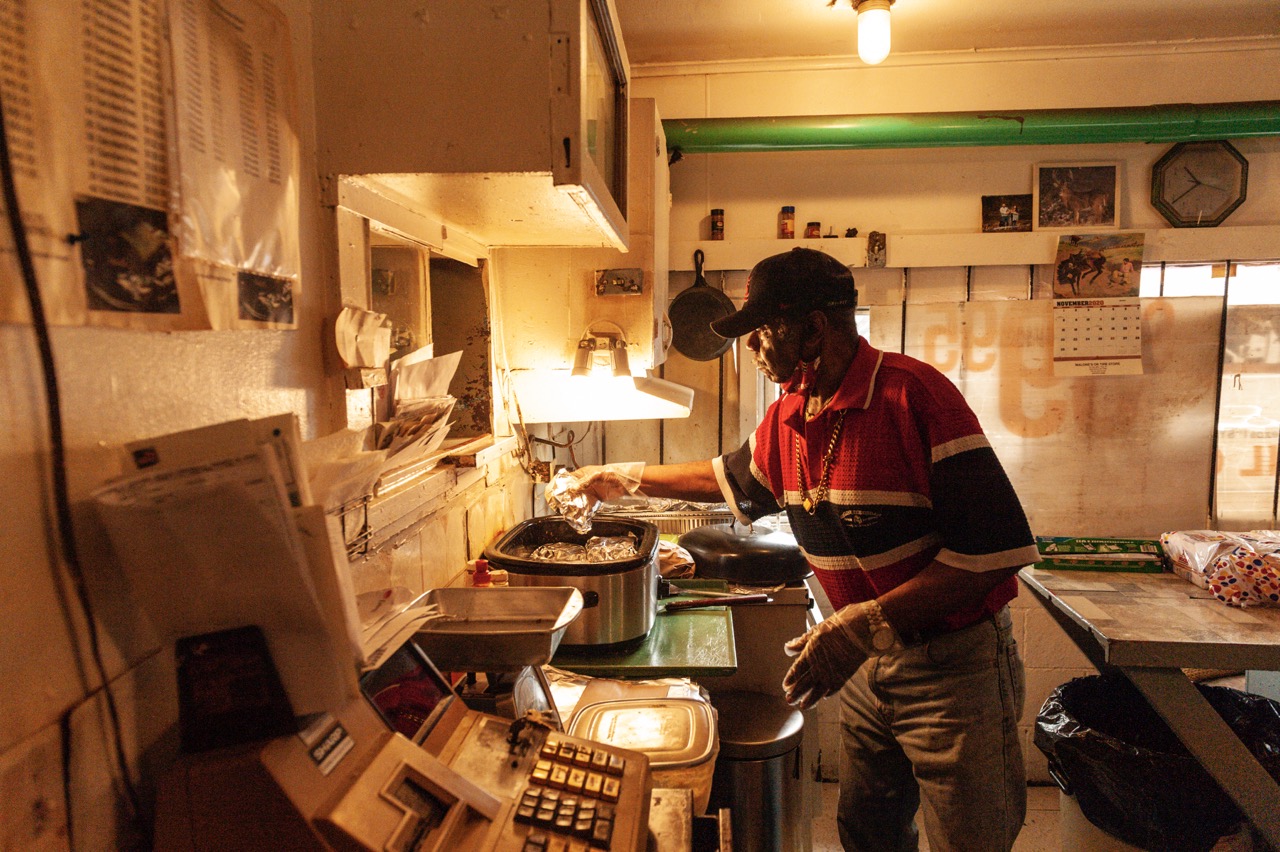
Courtesy of Arkansas Department of Parks, Heritage, and Tourism.
A white man clutching a brown paper bag stands in the dirt-and-gravel lot that fronts Jones Bar-B-Q Diner in the Arkansas Delta town of Marianna. Grease splotches the bag, a stain that envelops the bottom and flares up the sides.
The man appears to be sixty, maybe seventy. His face is wide and jowly. His hair is thin and comb-raked. He wears brown pants, a white shirt, and a baby blue windbreaker.
He could have left a couple minutes ago, could have jumped in his pickup and driven away, eating a barbecue sandwich from a foil wrapper, fighting the collapse of the two slices of white bread that contain, for the moment, a mound of hickoried and sauced ham and shoulder.
But the man lingers. The grease spreads.
He stares across the neighborhood. At rusted-out and busted-up trailer homes. At carbon-smudged chimneys that stand where clapboard bungalows once stood. At bottle-strewn ditches, flush with crabgrass and bull thistle.
The man is no barbecue pilgrim, questing for lost tribes and forgotten temples in this once-prosperous cotton kingdom. He’s likely a native. The man appears at ease in this neighborhood, the one that some old and intransigent whites still call "Niggertown." Just as he appears at ease across the levee and down the blacktop in his neighborhood, where sentry pines and picket fences frame tidy farmhouses.
Integration came early to barbecue. (And it remained, after the Civil Rights Movement came and went, while schools and other public accommodations re-segregated.) That’s the story we chowhounds tell, with a whiff of self-satisfaction.
That narrative lends a nobility to the restaurant trade. It reframes an industry built on a medieval hierarchy of labor, one that has, historically, tended to exploit the underclass. More important, it rationalizes that back-door white patronage of black barbecue restaurants foreshadowed an integrated present, when Jim Crow no longer lords over Southern tables.
Such a story is built, in part, on the reductive belief that, as the late Lawrence Craig of Craig’s Barbecue in nearby De Valls Bluff, Arkansas, once told me, "Whites figured blacks were good at barbecue. Same as they figured we could sing and dance. They gave us the green light, like they did with heavy lifting, because they didn’t want to do the work." (Craig said all of this without malice; he told me he was happy to have had the opportunity to cook.)
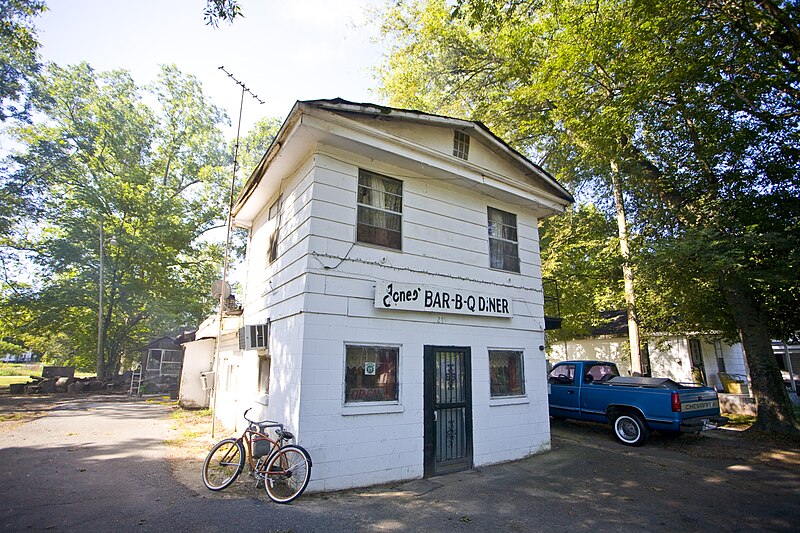
Jones BBQ, Marianna, Arkansas (2015) by Mike Norton, Creative Commons 2.0
In Southern Food: At Home, On the Road, in History, John Egerton argues that “before schools, churches, sports teams, and even other restaurants in the South got around to lowering the barriers of racial segregation, many of the region’s best barbecue pits maintained a thriving interracial trade.”
Egerton is right. A trip across the proverbial tracks to a barbecue shack offered whites early entree to everyday black pleasures. At the back door, out of sight, racial barriers were relaxed, and white dollars were welcomed.
The implication has always been that a shared appreciation for one of those pleasures, for smoked pig, was a catalyst that brought whites and blacks together. Yet I’ve begun wondering, in light of recent time spent in Marianna—seat of government for poverty-stricken Lee County—if that back-door patronage might be better understood as the culinary equivalent of a booty call. I’ve begun thinking of barbecue less as a cultural product and more as an ephemeral indulgence, entered into lightly, exited from easily.
Some incarnation of Jones Bar-B-Q Diner has been open, and relatively integrated, since the 1910s, maybe earlier. (If a firm opening date could be established, a task at which this writer has failed, Jones might prove to be the oldest black-owned restaurant in the South, and, perhaps, one of the oldest family-owned black restaurants in the nation.)
Walter Jones was the founder and first pitmaster. Along with a brother, Joe Jones, and a contemporary, Tobe Key, he is remembered, by both whites and blacks, as a sort of barbecue trickster, a master of the dark and fiery arts. "He was a drinker, always half in the bag," an octogenarian who grew up in Marianna tells me. “I can see him in a cloud of smoke with a bottle of sauce in his hand.”
Others recall the dogtrot house in which Walter Jones lived, and from which he began peddling his barbecue on Fridays and Saturdays. “It was unpainted, just bare wood,” says an older white patron. “There were barrels out back for burning down coals. They were set in the ground and cocked at an angle. And a pit, a block pit, in the ground. There was no real place to eat; everybody got their barbecue to take away.”
The original restaurant was nothing but “a screened-in back porch,” recalls an older black patron. “If you wanted sauce, you brought your own pint bottle and he filled it for you. You could get skins for free; ears and tails, too.”
Whole hog was the standard in the early years. Hacked from the carcass and pulled into sandwich meat, Walter Jones sold it from a metal roasting pan, set on a kitchen table. Patrons could snag a free piece of smoke-blackened rind, while waiting for him to weigh their purchase on a scale.
In a book of Lee County history compiled in 1986 to commemorate Arkansas’ sesquicentennial celebration, Hubert Jones—son of Walter Jones and father of present-day-proprietor James Jones—recalled the family’s initial barbecue set-up, circa 1925, as “a hole in the ground, some iron pipes and a piece of fence wire and two pieces of tin.”
“My brother and I would cook out at the farm, where we raised our pigs,” recalls sixty-three-year-old James Jones, the gray-haired and gimlet-eyed grandson of the founder. “My father would sell the meat in town at this place they had. They called it the Hole in the Wall. That’s what it was. Just a window in a wall where they sold meat from a washtub. That was it until he opened this place, in ’64.”
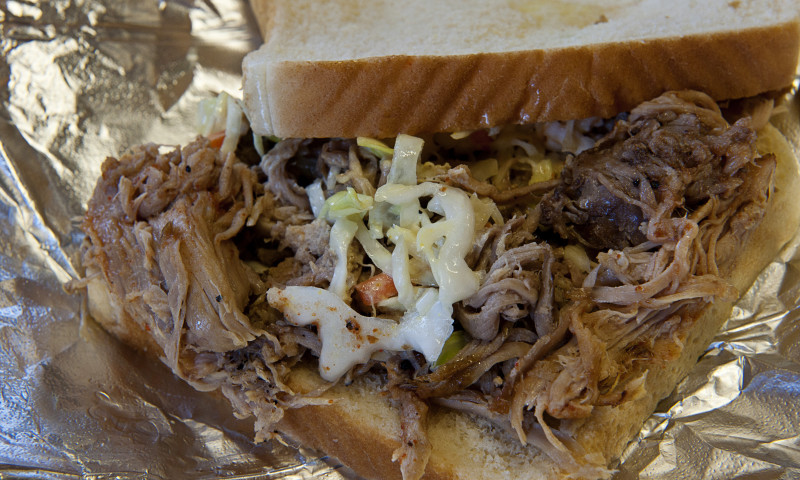
Courtesy of Arkansas Department of Parks, Heritage, and Tourism.
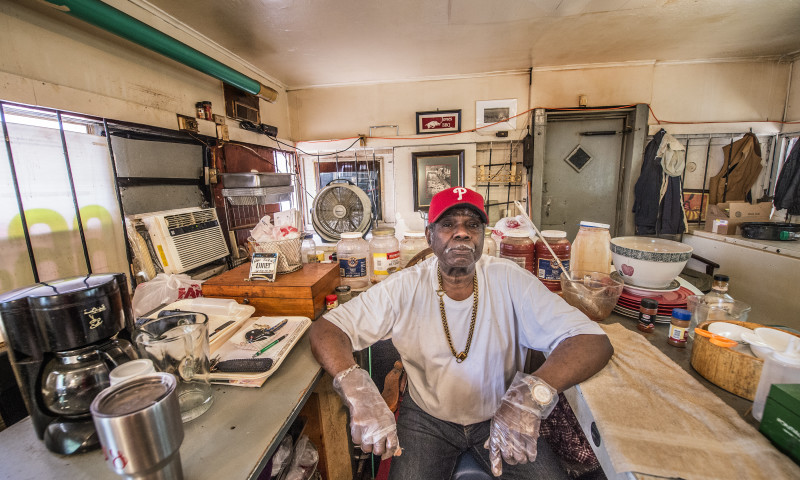
Courtesy of Arkansas Department of Parks, Heritage, and Tourism.
Today, James Jones works the restaurant his father, Hubert Jones, built. It’s a white cinder-block shotgun on a corner lot. At the prow of the building, above a small dining room outfitted with a side-by-side refrigerator and two dinettes, is a second-story apartment, wrapped in asbestos siding. Lace drapes frame the downstairs windows. Wrought iron filigrees the storm door. Oversized oak and hickory trunks hunker by the side door. A thin feather of smoke trails, always, from a brown block chimney.
Between sandwiches, which he serves through a square service window—the tight confines of which call to mind both a ticket booth at a porn theater and a Catholic church confessional—you’ll find Jones, propped on his elbows, tucked into the galley that runs the length of the rear counter. He keeps his back to the pit room where Theophilus Bannon, a twenty-five-year Jones veteran, known to friends as Spanky, works a long-handled shovel, ferrying coals to one of two block pits from a fireplace built so high and wide that you might expect to find it in a ski lodge.
Above Bannon, oak and hickory burnoff lacquers the rafters and roof. In spots, stalactites of calcified tar have formed on the two-by-fours overhead. Viewed in the slanted afternoon light, they call to mind icicles of black licorice.
The pits are swaybacked from the weight of time and the heft of tens of thousands of hogs. Rigged with a block-and-pulley system, they’re topped with thin sheets of tin that, when lifted, loose a sweet pall of smoke. (First you breathe deeply, then you hack and shudder.)
Spanky Bannon and James Jones usually cook meat three days a week. Some of it is their own, destined for two-dollar-and-fifty-cent sandwiches on white Wonder Bread. (Jones recently suspended service of pan-fried bologna, sluiced with barbecue sauce. "It was too much trouble for a buck," he explains. "People wanted mustard. People wanted mayonnaise. To hell with it.")
The rest of the meat belongs to others, hunters mostly, who bring in deer and coons and other creatures to be slow-smoked for thirty-five cents per pound. Open the back pit and you’ll spy their consignments, wrapped in tinfoil, tagged with a name and a pickup date. (On a recent afternoon, a couple of Lee County School Board turkeys shared pit space with a brace of bacon-wrapped quail, property of a local auto-parts dealer.)
James Jones doesn’t live upstairs like his parents did before him. But on the nights he cooks shoulders and hams, he sleeps in what was once their apartment. "I can’t remember when I didn’t smell like smoke," he tells me. "That’s the price you pay. That, and a lack of sleep for going on twenty years."
As he makes sandwiches, scooping chopped meat from an aluminum foil–wrapped Crock-Pot, measuring each payload on one of his grandfather’s old scales, drenching each in a paprika-and-cayenne red-vinegar sauce, squirted from a repurposed Aunt Jemima bottle, James Jones drops his guard: "It’s not so much about looking after the meat, keeping it from burning or something," he tells me, almost twisting his face into a scowl. "It’s about keeping the meat from being stolen."
This is my fourth trip to Marianna in as many weeks. On past visits, Jones has declined, with both grace and finality, a discussion of his business history. He has deflected questions about his grandfather by dangling the prospect of a collection of family history, now in the possession of relatives in Chicago. "If we could get that book, you’d have your story," he has told me. "You’d be set. Without that, you’ve got all I got to give. There’s not much to tell."
But now, for reasons that are unclear, Jones is leveling with me. He’s telling me about how his ancestors used to burn wood down into embers in old oil barrels. He’s talking about the sense of accomplishment he derived from cooking his first pig. He’s telling me that his son—who coaches at a nearby high school and moonlights at Wal-Mart—won’t be following him into the business.
And Jones is talking about how thieves have begun preying on his business, about how they’ve taken to stealing his meat, straight off the grill. "One night, this guy cut in here and tried to steal a whole hog I was cooking for someone," he says. "It was too big for him to lift, but he got away with three shoulders. Hauled them away in a meat box. Hell of a thing to happen, in your own neighborhood."
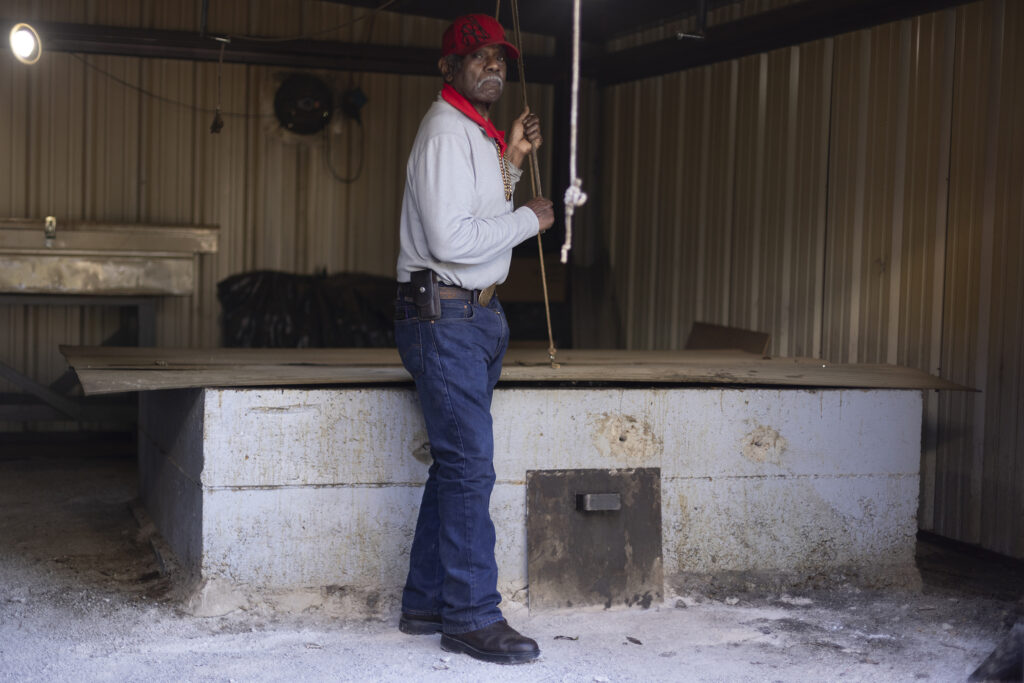
Courtesy of the Black BBQ Hall of Fame.
Early on, Lee County was a place of possibility for newly freed blacks, or at least it was purported to be. In the late 1800s, when Arkansas was heralded as the great Negro state of the country, with "rich lands and ìmeagre prejudice" and "opportunities to acquire wealth," the Arkansas Delta was pitched as a place where "sweet potatoes grew as large as watermelons" and "money could be plucked from the trees, like picking cotton off the stalk."
It was also a place of political ferment. In 1891, when the Cotton Pickers’ League called a general strike as a means of winning pay concessions from planters, only two places managed a work stoppage. One was Lee County.
Nearly one hundred years later, in 1971, in the wake of the Civil Rights Movement, black citizens of Marianna, trying to wrest economic control from the white oligarchy, staged a year-long boycott of white-owned downtown businesses. (The flashpoint for the boycott was, appropriately enough, an argument over pizza service for a black patron at the local Mug and Cone drive-in.) Some believe that was the beginning of the end for Marianna’s downtown vitality.
Today, on the town square, a third of the businesses are boarded. A funeral home, with two gold hearses standing at the curb, occupies the busiest corner. Inside the Lee County Courthouse, a janitor polishes the terrazzo floor, as if the sheen of the marble might somehow compensate for the dull pallor of the town.
In a nearby office, at the close of a conversation about the economic climate, a local official observes, "Everybody on TV is talking about a recession. Maybe a depression. Where have they been? In Lee County, we’ve been in a recession for thirty years."
It’s true. Thirty percent of Lee County residents live in poverty. Other measures lag the state and the country similarly, including education and nutrition.
The reasons for these statistics are clear to those with an understanding of the Mississippi River Delta region. Jobs associated with the manual harvest of cotton have vanished. So have middle-class whites and blacks. Neglect of public schools in favor of white-flight academies has fueled and sustained divides of class and race. For want of a well-educated and well-trained workforce, economic redevelopment has stalled.
The political ferment of decades past has subsided. And the local economy has ossified. New roads have bypassed Marianna. So have new immigrants. (While the Hispanic population has skyrocketed in other parts of Arkansas, it has flatlined in the Delta, where new job opportunities are few.)
According to prevailing wisdom, economic and cultural stasis is good for barbecue, which is, after all, a vestige of the Bronze Age blowing smoke in the present. To eat in a proper barbecue joint is to engage in a time-travel exercise, wherein cookery is reduced to its most elemental, and the past—both good and ill—emerges from the smoky depths each day.
That, it seems, is what Jones Bar-B-Q Diner promises. And that is what Jones Bar-B-Q Diner delivers.
And that is why, not thirty minutes after an old white man stood in the parking lot, bag in hand, he was replaced by a younger white man, bearing his own burden, gripping his own bag, a similar stigmata of grease defining the barbecue within. That man, I might as well tell you, looked a lot like me.



